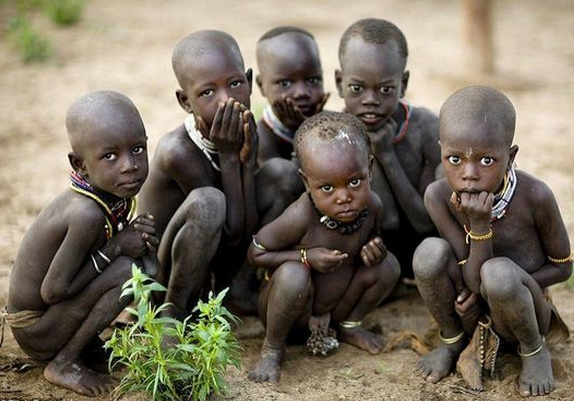A 45-year-old inconsolable woman narrates her painful story about her fifteen children being killed by tribal elders in southern Ethiopia's Omo Valley.
日前,埃塞俄比亚南部的奥莫山谷一位悲痛欲绝的45岁女人,讲述了她的15个孩子被部落长老杀死的故事。
Buko's seven sons and eight daughters were all killed at birth by village elders.
布科的七个儿子和八个女儿,都是一出生便被村里的长老杀死。
For Ms Buko, the nightmare started when her future husband failed to be initiated as a man in a traditional ceremony and thus could not marry a woman.
布科女士的噩梦从她的未婚夫没能通过传统的成人礼,因此不能结婚开始。
Despite elders prohibition the wedding took place and every child born in this family was doomed to death as he/she was considered to be cursed. Ms Buko wasn't required to kill her own child, she was forced to stand and watch as elders carried her babies away to their deaths.
在不顾长老们的反对举行婚礼后,这个家庭的每个孩子都被认为是受了诅咒,是非死不可的。虽然布科女士没有被要求杀死自己的孩子,但长老们带走孩子时,她却被迫只能站在一旁看着。

"I lost five plus five plus five babies – 15 in total. I had seven males and eight females. During this time, our tribal traditions were very hard. It was not me who killed the babies. It was other people from my village. I did not respect our traditions, so they killed my children."
"我失去了五个加五个加五个孩子--总共15个。我曾有7个男孩和8个女孩。在这期间,我们部落的传统很强硬。不是我杀死了这些婴儿,是村子里的其他人。因为我没有尊重我们的传统,所以他们杀了我的孩子。"
Mingi is the traditional belief among Karo, Hamar and Bano tribes in southern Ethiopia that adults and children with physical abnormalities will bring ill fortune, drought, famine, disease and death to its tribe, if they aren't killed.
"Mingi是埃塞俄比亚南部的Karo,Hamar和Bano部落的传统信仰,他们认为,身体有异常的成人和孩子如果不被杀死,就会给部落带来厄运--干旱,饥荒,疾病和死亡。"
A child can be declared Mingi for the following reasons: because of disabilities, because their parents didn't get permission for a pregnancy from the elders, because they are part of a set of twins and most cruelly of all, because their teeth develop the wrong way.
一个孩子被宣布为Mingi的原因可能是残疾、父母没有得到长老的许可便怀孕、双胞胎的一员以及最残暴地--牙齿长错了方向。
Cursed children are left alone to be eaten by hyenas, thrown to hungry crocodiles or simply starved to death in a locked hut.
受诅咒的孩子可能会被扔在野外让鬣狗吃掉,或是扔给饥饿的鳄鱼,或只是关起来饿死。
The Karo officially banned the practice in July 2012, while around 50,000 individuals secretly continue to practice it in Bana and Hamar communities. The charity organizations working in Ethiopia ask parents of ‘mingi' children to give them to orphanages or foster parents.
Karo部落在2012年7月禁止了这类行为,但Bana和Hamar约5万人还在偷偷继续着。埃塞俄比亚的慈善组织请求这些"mingi"孩子的父母把他们送到孤儿院或者送去寄养。
It is illegal but elders do it in secret and nobody has been arrested for doing it so far. Until things change, the pain for women like Ms Buko will continue. "At the time, I had no choice. Nowadays, when i see the women giving birth or giving milk, I feel sorry. I feel lonely. Nobody is on my side."
这虽然是违法的,但长老们会偷偷地做,目前还没有人因为这一行为而被逮捕。在有所改变以前,像布科女士这样的女人的痛苦也将继续。"当时我没有选择。现在,当我看到正在生孩子或哺乳的女人时,我就很难过。我感觉孤独。没有人站在我这边。"













